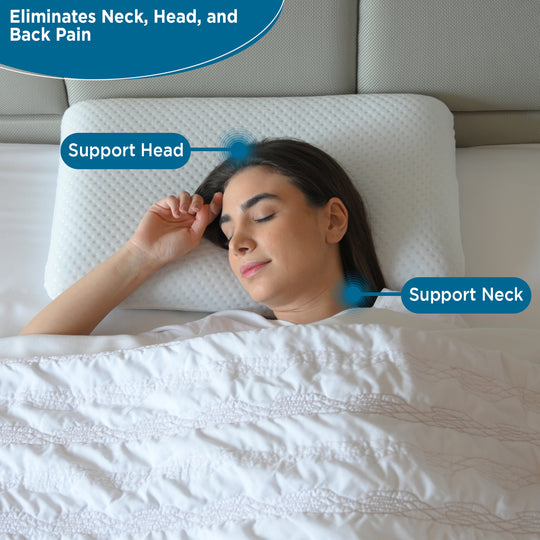A cup of coffee or tea is an important part of the morning routine for most people out there. In our modern society, it is quite common to start our day with a cup of coffee or tea and unwind it with one or two alcoholic drinks. Regardless of how much we love consuming them, they do have some negative impacts on our sleep quality and overall well being.
In this blog, we'll explore the effects of caffeine and alcohol on sleep and tips on how to manage the consumption to promote better sleep.
Effects of Caffeine on Sleep
Caffeine is a natural stimulant found in coffee, tea, chocolate, and energy drinks and it works by blocking the effects of adenosine, a neurotransmitter that promotes sleepiness. So, if you consume a high dose of caffeine during the day, it will not let you fall asleep at night.
Caffeine has some positive effects on body and mind such as it increases alertness and concentration, especially in moderate doses but when consumed in excess and close to bedtime,it can also interfere with sleep.
The effect of caffeine on sleep depends on individual sensitivity and the time at which it is consumed. If you are consuming caffeine in the late afternoon and evening, it can make it difficult for you to fall asleep and also reduce your overall sleep quality.
Caffeine works in the brain by inhibiting adenosine receptors. Adenosine is a sleep-promoting substance produced by the brain during waking hours. Adenosine naturally accumulates in the brain as you stay awake. The more it piles up, the more tired you become. Caffeine inhibits this process, so you remain attentive and vigilant.
According to research, doses of 100mg taken around bedtime impair the capacity to fall and stay asleep. However, if you consume less than that, such as a cup of green tea as part of your nightly routine, it is unlikely to have the same effect.
Try to drink coffee or take in any caffeine-rich substance in the first half of the day in moderation so that it doesn't mess with your sleep.
Effect of Alcohol on Sleep
You'll probably nod off earlier than usual if you have a few cocktails or a few glasses of wine in the evening. Who among us hasn't left the dishes until the next morning or skipped a skin-care routine after a dinner party or a night out?
Even if you do fall asleep, too much alcohol is going to result in an anxious night. That's because alcohol affects your sleep architecture, which refers to the usual stages of deeper and lighter sleep that we all experience every night. According to researchers, a night of drinking can "fragment," or disturb, these rhythms, causing you to wake up many times as you ricochet through the normal stages of sleep.
Most experts believe that drinking will disturb your sleep, regardless of age or gender. Because alcohol depresses the central nervous system, experts advise against combining it with sleep aids like Ambien, Tylenol PM, Benadryl, or even melatonin supplements.
Drinking can also make you snore at night. It relaxes your body's muscles, allowing the tissue in your throat, mouth, and nose to block air passage and vibrate more.
The less you drink, the lower your risk of alcohol-related injury. For other folks, not drinking at all is the safest choice.
How to Manage Consumption for Better Sleep
You can follow these tips to minimize the negative effects of caffeine and alcohol on sleep:
- Limit Consumption: Always monitor your intake of caffeine and alcohol and try to consume them in moderation so that they will not disturb your sleep.You can drink alternative beverages such as herbal tea or decaffeinated coffee in the evening.
- Time it Right: Avoid consuming caffeine in the late afternoon and evening to allow your body to wind down naturally before bedtime. Similarly, limit alcohol consumption in the hours leading up to sleep to minimize disruptions to sleep quality.
- Stay Hydrated: Drink plenty of water throughout the day, especially if you consume caffeinated or alcoholic beverages. Dehydration can have negative effects on sleep.
- Establish a Bedtime Routine: Create a relaxing bedtime routine to signal to your body that it's time to sleep. You can do activities such as reading, taking a warm bath, or practicing relaxation techniques like deep breathing or meditation.
- Monitor Your Response: Try to consume caffeine and alcohol as per your limit, pay attention to how caffeine and alcohol affect your body and sleep quality and adjust your consumption accordingly. Everyone's tolerance and sensitivity are different, so it's important to find what works best for you.
Conclusion
Caffeine and alcohol can give you temporary boosts in energy and relaxation, but they can also disrupt the balance of our sleep-wake cycle. You must consume these in limit and understand the effects of caffeine and alcohol on your body.
Along with changing your drinking habits, you can also add some accessories like a microfiber pillow to enhance your sleeping experience. Microfiber pillows are very beneficial over standard pillows. They can keep your head and neck in proper alignment and are typically more supportive. They may also be machine washed and dried, and they are often more durable than traditional pillows.
By adding a microfiber pillow into your sleep routine, along with mindful consumption of caffeine and alcohol you can sleep well at night and wake up all refreshed and energized every morning. Remember, investing in your sleep is investing in your overall health and well-being.











